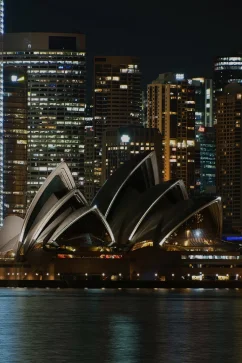Amsterdam’s Nightlife: A Vibrant Tapestry of Entertainment and Culture
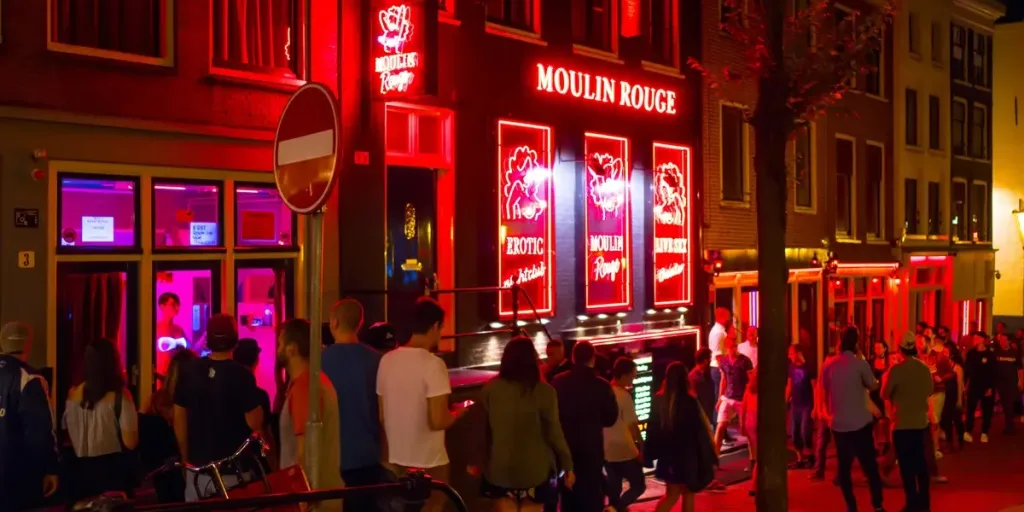
Amsterdam’s nightlife is a dynamic and multifaceted tapestry that comes alive when the sun sets, offering a kaleidoscope of entertainment, culture, and social experiences. From the vibrant Red Light District to eclectic clubs and intimate jazz bars, the city’s after-dark scene appeals to a diverse audience. This report explores the diverse facets of Amsterdam’s nightlife, highlighting its significance, popular attractions, and the cultural and economic impact it has on the city.
The Red Light District
Amsterdam’s Red Light District, or “De Wallen” in Dutch, is a district that both mystifies and intrigues visitors from around the world. This report will delve into the enigmatic realm of the Red Light District, shedding light on its history, significance, attractions, and the complex legal and social framework that surrounds it.
History and Significance
The Red Light District’s roots trace back to the 14th century when the city was a thriving port. Sailors, traders, and travelers frequented the area, and so did the women who provided their services. Over the centuries, the district evolved, becoming an integral part of Amsterdam’s cultural landscape.
Today, it remains a symbol of the city’s liberal attitude towards certain aspects of sex work and personal freedom. The district’s significance lies in its status as a unique and historical part of Amsterdam. It is not just an area for adult entertainment but a reflection of the city’s progressive and open-minded ethos. It serves as a microcosm of Amsterdam’s diverse and inclusive culture, allowing for the coexistence of the Red Light District’s activities with other aspects of city life.
Attractions
- Red-Lit Windows:The most iconic feature of the district is the red-lit windows where sex workers, or “prostitutes” as they are officially called, present themselves. Visitors can witness this unique form of public solicitation, which is legal and regulated.
- Cafés and Bars: The Red Light District is not just about the windows; it also hosts a variety of cafés, bars, and restaurants, allowing visitors to relax and take in the atmosphere.
- Erotic Museums: The district boasts several museums dedicated to erotica, exploring the history, art, and culture of human sexuality.
- Oude Kerk: Amsterdam’s oldest church, Oude Kerk, is located in the heart of the Red Light District. This historical site provides an intriguing contrast to the district’s activities and serves as a reminder of the area’s multifaceted nature.
Legal Framework
Sex work in the Red Light District is regulated and recognized as a legitimate profession in the Netherlands. Sex workers are subject to the same tax and employment laws as any other profession, ensuring their rights, health, and safety. While the district may be seen as a symbol of liberal attitudes, it is still subject to various regulations aimed at ensuring the well-being of all parties involved.
The Red Light District of Amsterdam is a multifaceted district that both challenges and reaffirms societal norms. It symbolizes Amsterdam’s progressive, open-minded character and its ability to address sensitive issues through a legal and regulated framework. The district’s significance extends beyond its association with adult entertainment, serving as a microcosm of the city’s cultural diversity, freedom, and tolerance.
Concerts and Live Music
Amsterdam is a city that resonates with the rhythms of live music and melodies that span the spectrum of genres. This report explores the vibrant world of concerts and live music in Amsterdam, delving into its significance, the diversity of performances, and the venues that host these harmonious gatherings.
The Significance of Live Music
Live music plays a vital role in Amsterdam’s cultural landscape, contributing to the city’s vibrant identity as a hub for artistic expression and creativity. Whether it’s a classical symphony, an electrifying rock concert, or an intimate jazz performance, live music bridges cultural divides and unites people through the universal language of melody.
Diverse Performances
- Classical Concerts: Amsterdam is home to world-class classical ensembles, including the Royal Concertgebouw Orchestra. The Concertgebouw, renowned for its exceptional acoustics, hosts classical performances that enchant audiences with the timeless compositions of Mozart, Beethoven, and others.
- Pop and Rock: The city’s venues are a stage for international and local pop and rock artists. Paradiso and the Ziggo Dome are iconic venues that have hosted legendary acts, making Amsterdam a top destination for music enthusiasts.
- Jazz and Blues: Amsterdam’s jazz scene is lively and diverse. The Bimhuis, known for its avant-garde jazz, and the famous North Sea Jazz Club provide an intimate setting for jazz and blues aficionados.
- Indie and Alternative: Smaller venues like Melkweg and Paradiso Noord offer a platform for indie bands and alternative music. These intimate spaces create an electric atmosphere for music lovers.
- Electronic Dance Music: As the birthplace of electronic dance music, Amsterdam hosts renowned electronic music events, including Amsterdam Dance Event (ADE), attracting electronic music enthusiasts from around the world.
Iconic Venues
- The Concertgebouw: This prestigious concert hall is known for its impeccable acoustics and hosts classical concerts and recitals. It is considered one of the world’s most illustrious music venues.
- Paradiso: A former church converted into a music venue, Paradiso is an iconic space for pop, rock, and alternative music performances.
- Ziggo Dome: A modern arena that hosts international superstars and large-scale events, creating a grand concert experience.
- Bimhuis: Located in a striking building overlooking the IJ River, the Bimhuis is a hub for avant-garde jazz and experimental music.
- Melkweg:This venue has been a cornerstone of Amsterdam’s music scene for decades, offering a diverse range of live music performances, including indie and alternative acts.
Festivals and Events
Amsterdam is home to a multitude of music festivals and events throughout the year. These include the aforementioned Amsterdam Dance Event, the Grachtenfestival showcasing classical music, and King’s Day celebrations featuring live music performances on the city’s streets and canals. Concerts and live music in Amsterdam are a testament to the city’s commitment to artistic expression, creativity, and cultural diversity. They serve as a harmonious bridge that connects people from various backgrounds, providing a space where melodies, rhythms, and emotions converge.
These performances in the city’s iconic venues, intimate clubs, and open-air festivals create an atmosphere that is both vibrant and resonant. Amsterdam’s live music scene invites both locals and visitors to embrace the universal language of music, allowing them to share unforgettable moments and create lasting memories. It is a harmonious journey that underscores the city’s cultural richness and its enduring love for the magic of live music.
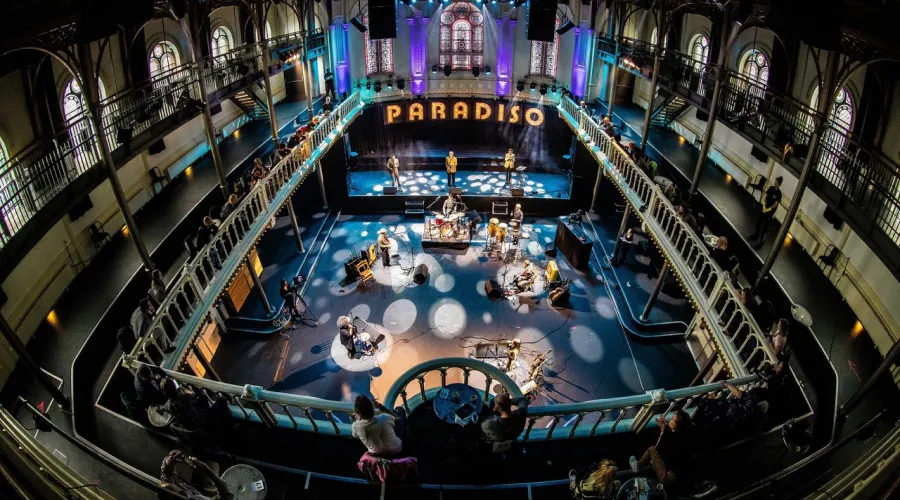
Cafés and Bars
Amsterdam’s nighttime transformation is incomplete without a visit to its charming cafés and bars. This report delves into the allure and significance of Amsterdam’s café and bar culture, the diverse range of establishments, and the inviting atmosphere that defines this essential facet of the city’s nightlife.
The Significance of Cafés and Bars
Amsterdam’s café and bar culture is deeply rooted in its social fabric. These establishments offer more than just drinks; they provide a space for relaxation, connection, and leisure. Whether it’s a centuries-old brown café or a modern craft beer bar, these venues play a vital role in the city’s social and cultural life.
Diverse Establishments
- Brown Cafés: Amsterdam is famous for its brown cafés, traditional Dutch pubs characterized by their cozy, brown-hued interiors, vintage décor, and a laid-back atmosphere. These cafés offer a glimpse into the city’s history and are often frequented by locals and tourists alike. Café ‘t Smalle and Café Chris are excellent examples of these timeless venues.
- Craft Beer Bars: Over the years, Amsterdam has witnessed a craft beer revolution. Craft beer bars like Arendsnest and BeerTemple have sprung up, offering an extensive selection of local and international craft brews, along with knowledgeable staff who can guide you through your beer journey.
- Cocktail Bars: The city boasts a growing number of cocktail bars where skilled mixologists craft exquisite cocktails with precision. Venues like Tales & Spirits and Hiding in Plain Sight are known for their creative libations and upscale ambiance.
- Jazz and Blues Bars: For music enthusiasts, Amsterdam has a variety of jazz and blues bars that host live performances in intimate settings. The Bourbon Street and Maloe Melo are popular choices for those seeking soulful tunes along with their drinks.
- Specialty Cafés: The city also embraces a host of specialty cafés, including jenever (Dutch gin) tasting rooms and coffee shops, where you can savor a traditional Dutch spirit or enjoy a cup of locally roasted coffee.
Historical and Iconic Venues
- Café Hoppe: Established in 1670, Café Hoppe is one of Amsterdam’s oldest brown cafés. It maintains its classic charm with an impressive jenever selection and is a favorite among locals.
- Proeflokaal Wynand Fockink: This historic jenever distillery, dating back to 1679, invites visitors to taste Dutch gin and liqueurs in a traditional setting.
- Brouwerij ‘t IJ: Located near a picturesque windmill, this brewery and tasting room is renowned for its craft beers and relaxed atmosphere.
- Café de Dokter: This tiny brown café, founded in 1798, retains its historical allure and is a treasure trove for those seeking a cozy, old-world ambiance.
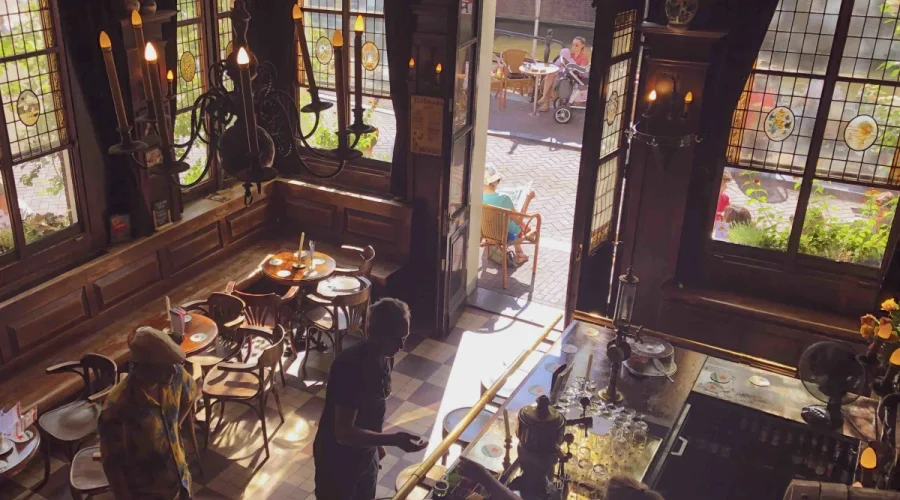
Nightclubs
Amsterdam’s nightlife is renowned for its diversity, and the city’s nightclubs are at the epicenter of this vibrant scene. This report delves into the allure and significance of Amsterdam’s nightclubs, the range of musical experiences they offer, and the venues that set the stage for unforgettable nights.
The Significance of Nightclubs
Nightclubs are more than just entertainment venues; they are cultural and social hubs that breathe life into Amsterdam’s evenings. They play a vital role in the city’s nightlife, embracing diverse musical genres and welcoming visitors from around the world.
Musical Diversity
- Electronic Dance Music (EDM): Amsterdam holds a special place in the global EDM scene. The city is synonymous with electronic music, and it’s home to legendary nightclubs such as De School, Shelter, and Marktkantine. These venues host renowned DJs, live performances, and immersive light and sound experiences.
- Hip-Hop and R&B: Nightclubs like Jimmy Woo and the famous Melkweg showcase the best of hip-hop and R&B music. These venues create an electric atmosphere where revelers can groove to the latest beats.
- House and Techno: House and techno enthusiasts have an array of nightclubs to choose from. Radion and De Marktkantine are known for their underground vibes and innovative lineups, while venues like Shelter provide a unique, subterranean experience.
- Pop and Commercial Music: Some nightclubs, including Paradiso, transform into dance floors featuring a mix of pop, rock, and commercial hits. These venues offer a more mainstream atmosphere for those looking to dance to familiar tunes.
Iconic Venues
- De School: Housed in a former technical school, De School is an iconic nightclub known for its forward-thinking music programming and unique ambiance. The venue frequently hosts extended DJ sets, making it a favorite among the city’s electronic music enthusiasts.
- Shelter: Located under the A’DAM Tower, Shelter is known for its immersive sound system and dedication to underground techno and house music. It’s a venue where both emerging and established artists share their passion for electronic beats.
- Paradiso: Originally a church, Paradiso is a historic venue that hosts a wide range of live concerts and DJ events. It provides an eclectic musical experience and has a unique atmosphere, as you dance beneath stained glass windows.
- Jimmy Woo: A high-end club in the heart of Amsterdam, Jimmy Woo combines sophistication with a vivacious ambiance. It’s a hotspot for hip-hop and R&B lovers.
Nightclubs in Amsterdam are the heartbeat of the city’s nightlife. They provide a platform for musical diversity, from electronic beats to hip-hop grooves, and they invite visitors to experience a night of music, dancing, and cultural immersion. These venues embody the city’s open-minded spirit and its commitment to offering unforgettable nights. Amsterdam’s nightclubs are where the night truly comes alive, and whether you’re seeking to dance to pulsating beats or to enjoy a more intimate live performance, they offer an unmissable opportunity to savor the city’s vibrant nightlife and musical richness.

Cultural Events
Amsterdam, a city renowned for its rich cultural heritage, welcomes an array of cultural events throughout the year. This report delves into the significance of these events, their diversity, and the venues that host them, celebrating Amsterdam’s commitment to nurturing creativity and cultural expression.
The Significance of Cultural Events
Cultural events are a cornerstone of Amsterdam’s identity. They provide a platform for creative expression, fostering artistic talent and promoting cultural diversity. These events are not just celebrations of art, but also opportunities for locals and visitors to engage with the city’s vibrant cultural scene.
Diverse Cultural Offerings
- Art Exhibitions: Amsterdam’s museums and galleries frequently host exhibitions showcasing a wide range of artistic movements, from classical to contemporary. The Rijksmuseum, Van Gogh Museum, and Stedelijk Museum are among the city’s most celebrated venues for art exhibitions.
- Film Festivals: The city is a hub for film enthusiasts, with events like the International Documentary Film Festival (IDFA) and the International Film Festival Rotterdam (IFFR) screening documentaries and independent films from around the world.
- Theater and Performances: Amsterdam boasts numerous theaters, including the Royal Theater Carré and the Amsterdam City Theater, which host a variety of plays, musicals, and live performances.
- Music Festivals: Amsterdam offers a plethora of music festivals, from classical events like the Grachtenfestival to contemporary gatherings like the Amsterdam Dance Event (ADE) and the Amsterdam Roots Festival, which celebrate world music.
- Cultural Festivals: Events such as the Amsterdam Light Festival, celebrating light art in the city’s canals, and King’s Day, a national holiday with street parties and cultural festivities, showcase the city’s vibrant cultural scene.
Iconic Cultural Venues
- Concertgebouw: Known for its exceptional acoustics, the Concertgebouw hosts classical concerts, recitals, and orchestral performances, making it one of the world’s premier classical music venues.
- Paradiso and Melkweg: These iconic venues are renowned for hosting concerts and events spanning various musical genres, from pop and rock to indie and electronic music.
- Eye Filmmuseum: Situated on the picturesque waterfront, this museum showcases the history of cinema with exhibitions, film screenings, and a stunning panoramic view of Amsterdam.
- Muziekgebouw aan ‘t IJ: This contemporary concert hall focuses on experimental and avant-garde music, offering a unique space for cutting-edge performances.
- National Opera & Ballet: The Grand Opera House, which is part of the Dutch National Opera & Ballet, presents classical and contemporary opera and ballet productions.
Cultural events in Amsterdam are a testament to the city’s unwavering commitment to nurturing creativity, fostering artistic expression, and embracing cultural diversity. Whether you’re an art enthusiast, a film buff, a music lover, or simply curious about the world of culture, Amsterdam’s cultural events offer a captivating journey through the heart of its creative landscape.
These events are a vibrant tapestry of artistic expression and cultural celebration, inviting locals and visitors to explore the beauty and complexity that defines this exceptional city. As Amsterdam continues to evolve, its cultural events remain an essential part of its identity, offering a diverse array of opportunities to engage, connect, and be inspired by the city’s cultural richness.
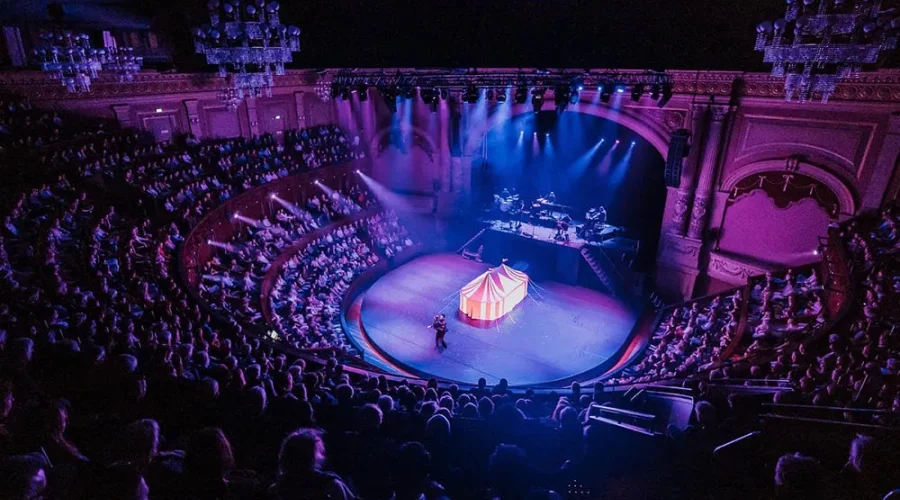
Conclusion on Amsterdam’s nightlife
Amsterdam’s nightlife isn’t just a dynamic and integral part of the city’s cultural identity; it’s a living, breathing testament to the unique blend of traditions and modernity that defines the Dutch capital. As the sun dips below the horizon, the city transforms into a captivating world of entertainment and social interaction that embraces both visitors and locals alike.
As the city’s nightlife continues to evolve, Amsterdam remains a vibrant and integral component of its cultural landscape. It’s a place where people from all walks of life can connect, celebrate, and experience the unique energy of this captivating metropolis. The city’s nightlife invites you to revel in the blend of history and modernity, to explore its diverse and dynamic offerings, and to become part of a cultural narrative that transcends the boundaries of night and day. It’s a reminder that Amsterdam is a city that not only embraces its traditions but continually renews its commitment to diversity, openness, and the magic of the night.


